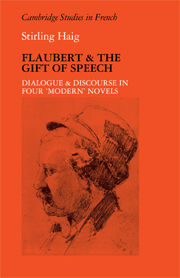2 - Learning dialogue
Published online by Cambridge University Press: 05 November 2011
Summary
Early writings and the Education sentimentale of 1845
For Flaubert, as for many a literarily inclined French youth of the nineteenth century, the literary genre was the theater. Having triumphed in seventeenth-century France in large part thanks to the dramatic works of fellow Rouennais Pierre Corneille, the theater's success spilled over into the eighteenth century, and even as Classicism was then degenerating into mechanical, servile imitations, its prestige was still so great that when the Romantics of 1830 wished to oust their great predecessors to found an esthetic of their own, the battle had to be fought in the Comédie Française itself, with Hugo's Hernani. Virtually all the great novelists of the nineteenth century – Balzac, Stendhal, Zola – began their careers with attempts at writing for the theater.
In Flaubert's eyes, the theater's prestige could be explained for reasons both personal and pedagogical. In a letter to Louise Colet (8 August 1846), he described himself as an instinctive “mountebank,” and told of his attraction for the stage in childhood and youth, a passion so strong that had he been born poor, he would have become an actor. In her memoir of her uncle, Caroline Commanville wrote that Flaubert was already composing tragedies at the age of ten, and that he performed them with friends, using his father's billiard table for his stage.
- Type
- Chapter
- Information
- Flaubert and the Gift of SpeechDialogue and Discourse in Four "Modern" Novels, pp. 22 - 52Publisher: Cambridge University PressPrint publication year: 1986

